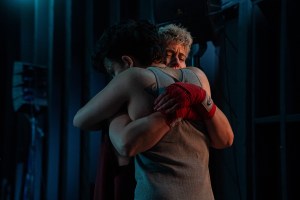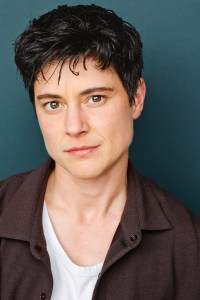With access to more creative outlets for LGBTQ+ filmmakers comes great progressive storytelling. At least, this is the case for writer-director Beck Williams, who aims to push the needle in Hollywood for a more nuanced representation of the trans experience onscreen. Recently premiering at the Oscar-qualifying film festival Out on Film in Atlanta, Pace, an LGBTQ+ boxing drama written and directed by Williams, explores an intimate look at navigating a difficult choice about one’s identity and sexuality. The short follows Remy (Williams), a transmasculine boxer struggling with dysphoria who hides his upcoming top surgery from his concerned partner (Kelly Lou Dennis), and Joey (Bex Taylor-Klaus), a trepidatious boxer, who returns to the gym post-transition, who fears judgment by his former boxing community. When Remy invites Joey to train together, they form a friendly bond while facing their unique challenges.
Here, Deadline speaks with Williams about martial arts, queer representation in Hollywood and crafting the trans experience.
DEADLINE: What kickstarted your idea for the short film?
BECK WILLIAMS: A couple of things came together at the same time. Bex [Taylor-Klaus] and I knew each other, and we were friends already, so we trained together. I taught them boxing and trained them, and we became close friends. So, at one point, I just remember thinking, “I love boxing.” I’m such a martial arts nerd. So, I thought it’d be amazing to make a boxing film around the trans experience since I’m passionate about that. But at the same time, I was going through transitioning in my own marriage and finding that to be a pretty isolating and challenging experience that we ultimately got through. I felt like I didn’t know where to turn or what to look for. I knew I couldn’t be the only person going through this, but it felt like that in the moment. I was like, “I don’t see this displayed that much, or I don’t know who to really talk to about this.” So, it was therapeutic to write it and have the desire to tell this type of story on behalf of, not to say that I’m explaining everyone’s experience or anything, but just to shed light on my community. We have so many barriers in transitioning and also in showing the side of a partner who has to go through that too. It’s hard for both people. That’s what I wanted to dive into.
Beck Williams
Beck Williams
DEADLINE: Let’s talk a little more about the boxing aspect. Why parse out the story this way?
WILLIAMS: I’m just a martial arts nerd. I’ve done it for around 20 years, but only boxing for the last six years. So, the reason I wanted to use that as a backdrop besides just loving the sport, to me, it encapsulated something that I found in terms of any life struggle or challenge I’ve been through. Especially with something like dysphoria, where if you’re so uncomfortable moving through, the discomfort in your own body, and also how you move through the world, or how I move through the world. There’s something about the flow of doing martial arts and boxing that takes you out of your mind and puts you into your body, which allowed me to appreciate everything my body was able to do even though I was struggling with my identity. So, I liked that as the backdrop because it’s a personal pursuit. And no matter what’s going on in your life, you can always challenge yourself. Also, there was that element in boxing that Bex and I talked about that has this aggression to it. And I liked the idea of this very masculine sport for these trans masculine people, and instead of leaning into the toxic masculinity aspect that [can sometimes be found in the sport], I wanted to depict a softer, vulnerable masculinity.
DEADLINE: As you continue on the festival circuit with Pace, how has your experience been being around filmmakers within the LGBTQ+ community?
WILLIAMS: Anytime I can be in a queer space, it’s very special. There’s such a connection to community, and especially being able to share our stories and witness each other’s stories. I feel it builds even more of a common understanding. And we don’t all go through the same thing. There’s a [commonality] trap, where it’s like, “Oh. A queer film is blank.” And it’s like, “No. Queer Cinema could be so many things.” There are many universal stories, so it’s been special to share these moments. With Pace specifically, I’ve had people who completely relate to it and have said, “Oh my gosh. I feel like I’ve been seen for the first time.” And then I’ve had family members of these people that aren’t queer, haven’t gone through a trans experience, but can still relate to it, or have learned something. So, it’s been nice to get that mix, and to do that within the community, it’s just really special.
DEADLINE: What were some fun, creative challenges in bringing your directorial short film debut?
WILLIAMS: The first challenge we came up against was, as everyone comes up against as an independent filmmaker, getting it funded. Once we decided to crowdfund, I was nervous, but it ended up being so wonderful because it brought our community together. I didn’t expect people to get so excited even before it was made and want to be a part of it. It also opened doors to meeting other folks, and it felt like we already had community through this film before it was even made. Another challenge was that we only had two locations, and one was this huge, amazing boxing gym, Forj Fitness, we love those guys. The challenge was that it was such a huge space that was difficult to light, and we only had two days out of the three total days we had to film Pace.
Also, I was so lucky to work with our DP, Leo Behrens. He’s phenomenal. Bringing him on and becoming friends with him was when it started to feel very real. The problem-solving leading up to [shooting] was about crunching down, visiting the space, talking together, seeing what was possible, and knowing what to cut back on. It is always hard, but it’s all about preparation.

Remy (Beck Williams) and Joey (Bex Taylor-Klaus) in Pace
DEADLINE: The characters here are very interesting. Remy, compared to Joey, seems much more relaxed and mature because it seems Remy is at a different stage of acceptance than Joey. However, outside of the gym, Remy isn’t exactly forthcoming and is more avoidant about what is really going on, while Joey is more visceral in their turmoil. Can you talk more about creating these two characters and their dynamic?
WILLIAMS: You hit the nail on the head when you say Remy’s avoidant. I think that is their biggest flaw. Joey is more forthcoming and expressive. Even if he is shy, he opens up to Remy pretty early. Remy, early on, is that rock for Joey but is giving the advice that they should be getting to Joey, where it’s like, “It’s OK if it takes time. You don’t have to have all the answers.” I think the biggest thing in this film is that you don’t have to have all the answers. It’s an ongoing journey. And to be in the middle of a journey is hard because you don’t have answers. So, then Joey turns that around and becomes that person for Remy later on after he’s gained his confidence back. Then, he finally tries to get Remy to open up, and Remy does. So, they swap. It’s this even balance between them that they’re both there for each other. It’s not really just a mentorship for one person or the other. They equally help each other move through with their friendship.
DEADLINE: There’s a great deal of nuance in the relationships you depict in regard to trans people and their partners. What would you like Hollywood to get from a short film like this?
WILLIAMS: Something that’s been brought up to me about this film is that people have been very curious to see that conversation with Remy and their partner Vanessa [Kelly Lou Dennis] because we don’t get to see that very often. Not to say that [the experience of LGBTQ+ people] is always a solo journey or anything like that, but I think it’s important too. I wanted to show a couple of things. For one, I’m hoping that it’s clear that no one is villainized in this situation because it’s not wrong for someone to want to be authentic in who they are and to transition. It’s also completely understandable for a partner to have a difficult time.
And it’s not about love lost necessarily. Every situation is going to be different, but I think it’s important to not have resentment. Vanessa is not resentful of Remy. If anything, she completely understands, but of course, it’s going to be hard for her too. But they both love each other. I think a big thing is that it’s possible to love each other so much and have something so difficult to work through. And it’s hard because you think, “Oh. Well, love can overcome anything,” and maybe it can, but that doesn’t mean that everything’s going to be easy to overcome. It’s just a very difficult situation. As much as I want people to understand the trans perspective, I also want people to understand the partner’s perspective. I think it’s important. They’re part of the journey. We don’t always get to hear what’s going on with them. I remember reading forums online when I was going through stuff, and a lot of partners were like, “Oh. I want to be supportive, but no one’s supporting me.” And that’s fair. I think both people need to be supported.
And it’s also something that, in my relationship, we didn’t feel comfortable talking to other people about it because it’s just not a topic you talk about a lot. You don’t usually talk about marital stuff much, generally. But this situation was a whole other topic that we don’t know anyone else who went through. So, in terms of Hollywood, I want to see this continuing idea of trans and queer relationships being normalized, complicated, flawed and beautiful.
[This interview has been edited for length and clarity]

